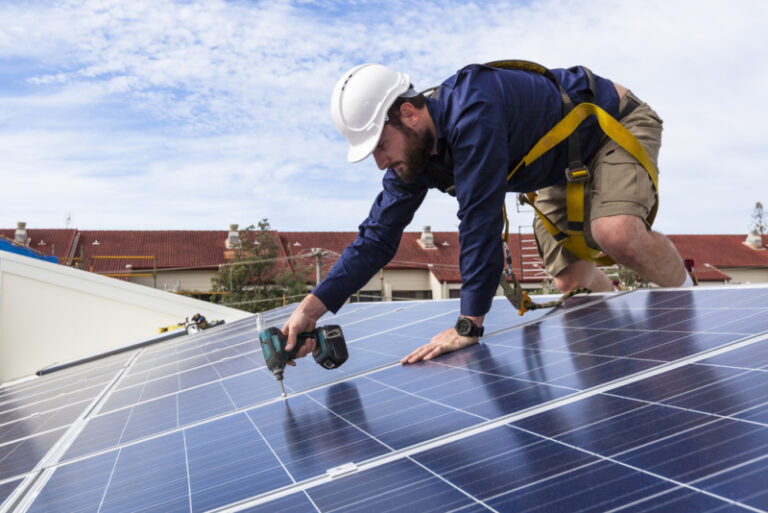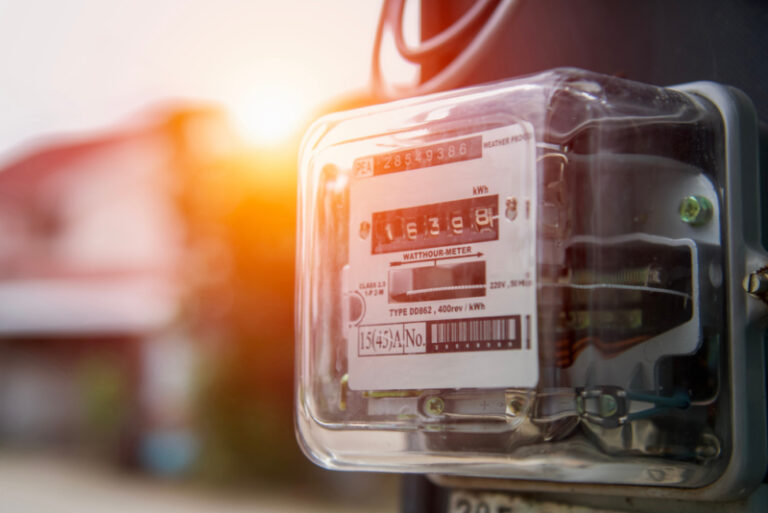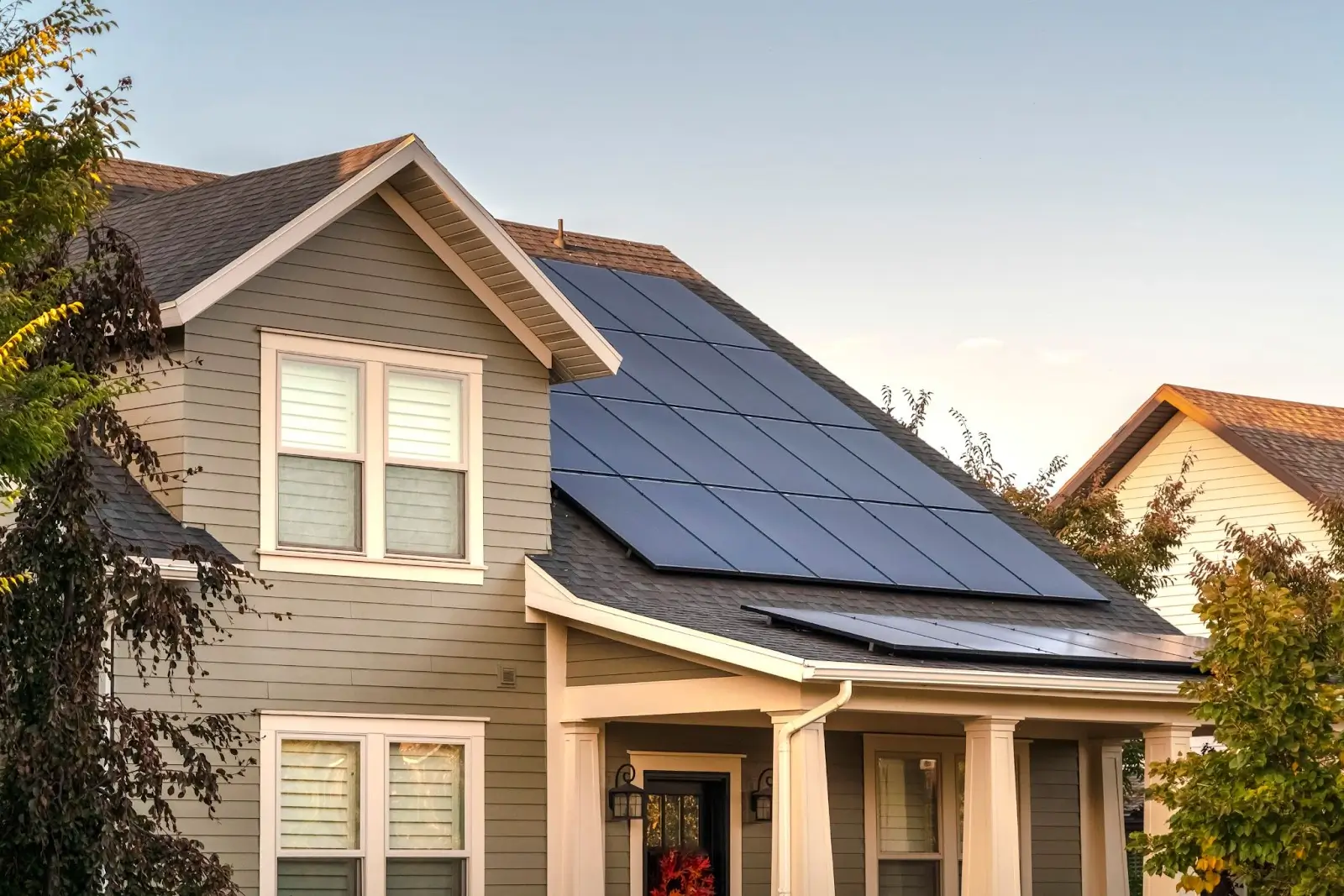Solar panel installation in Nevada has surged in recent years, thanks to the state’s abundant sunshine and favorable policies promoting renewable energy. If you’re a homeowner in the Silver State considering making the switch to solar, it’s crucial to have a clear understanding of the costs associated with solar panel installation.
In this comprehensive blog, we will delve into the financial side of solar energy, breaking down the costs and savings of installing solar panels for homes in Nevada. By exploring the importance of understanding the costs associated with solar panel installation, you’ll be well-equipped to transition towards a more cost-effective lifestyle under the warm Nevada sun.

Factors Affecting the Cost of Residential Solar Panel Installation in Nevada
Several factors can influence installation expenses, and understanding these elements can help homeowners make informed decisions.
Size and Type of Solar Panel System
One of the main factors that influence the cost of solar panel installation is the size and type of the solar panel system. Larger systems with higher energy output capacity will generally be more expensive.
The type of solar panel system can also affect the cost. For example, rooftop solar panel systems are commonly less expensive than ground-mounted systems, as the latter may require additional labor and materials. Additionally, the type of solar panels used (monocrystalline, polycrystalline, or thin-film) can impact the overall cost due to differences in efficiency and price.
Quality and Efficiency of Solar Panels
The quality and efficiency of solar panels are essential factors to consider when estimating the cost of residential solar panel installation in Nevada. Higher-quality, more efficient solar panels can generate more energy, which can help homeowners save money on their utility bills in the long run.
However, these panels often come with a higher upfront cost. When selecting solar panels, homeowners should weigh the initial investment against the long-term savings to find the best option for their budget and energy needs.
Complexity of Installation
The complexity of the installation process can also impact the cost of solar panel installation in Nevada. Factors such as roof type, roof pitch, and the presence of obstacles like chimneys, vents, or skylights can increase the time and labor required for installation, leading to higher costs.
In addition, homes with limited roof space or those that require electrical upgrades may also experience increased expenses. It’s essential to obtain a detailed quote from a reputable solar installation company to understand how these factors might affect your project’s overall cost.
Availability of Solar Incentives and Financing Options
Lastly, the availability of solar incentives and financing options can significantly affect the overall cost of residential solar panel installation in Nevada. Federal, state, and local incentives such as the Federal Investment Tax Credit (ITC), Nevada’s Renewable Energy Tax Abatement Program, and net metering programs can help homeowners reduce their upfront costs and make solar energy more accessible.
Furthermore, financing options such as solar loans, power purchase agreements (PPAs), and solar leases can help homeowners spread out the cost of installation over time, making it more affordable. It’s crucial to research and take advantage of these incentives and financing options to maximize the benefits of solar energy in Nevada.

Cost of Breakdown of Residential Solar Panel Installation in Nevada
Homeowners considering solar panel installation should be aware of the various costs involved in the process, and here are some of the breakdowns:
Equipment Costs
The most significant portion of solar panel installation expenses comes from the equipment itself. The primary components of a solar energy system include solar panels, inverters, mounting hardware, and wiring.
The cost of solar panels varies depending on their type, efficiency, and quality, with monocrystalline panels tending to be more expensive than polycrystalline or thin-film panels. Inverters, which convert the direct current (DC) generated by the panels into alternating current (AC) suitable for use in the home, also come in various types and price ranges.
Mounting hardware and wiring are typically less expensive but essential components of the system. Overall, equipment costs can account for 50-70% of the total solar panel installation cost in Nevada.
Installation Costs (labor, permits, and fees)
Installation costs for solar panel systems in Nevada typically include labor, permits, and fees. Labor costs are determined by the complexity of the installation and can be influenced by factors such as roof type, roof pitch, and the presence of obstacles like chimneys or vents.
The more complex the installation, the higher the labor costs will be. Permits and fees are required by local authorities to ensure that the installation meets all safety and building code requirements.
These costs can vary depending on the jurisdiction and the size of the system being installed. Installation costs generally account for 30-50% of the total solar panel installation cost in Nevada.
Additional Costs (maintenance, upgrades, and repairs)
While solar panel systems are relatively low-maintenance, homeowners should be prepared for occasional additional costs related to maintenance, upgrades, and repairs. Regular maintenance tasks such as cleaning the panels and inspecting the system for damage can help ensure optimal performance and prolong the system’s lifespan.
Upgrades may be necessary over time as technology improves, and new, more efficient equipment becomes available. Repairs may be required in the event of damage to the system, such as from severe weather or accidents.
Homeowners should also consider the cost of replacing the inverter, which typically has a shorter lifespan than the solar panels themselves. While these additional costs are generally minimal compared to the initial investment, they should be factored into the overall financial planning for solar panel installation in Nevada.
Financing Options for Installing Solar Panels for Your Home in Nevada
Let’s dive into the pros and cons of each option, as well as the eligibility requirements, to help you make an informed decision.
1. Cash Purchase
Pros:
- Highest long-term savings: By purchasing your solar panels outright, you can avoid interest fees and enjoy the full benefits of energy savings.
- Federal tax credit: You’ll be eligible for a 26% federal tax credit, which can significantly reduce your installation costs.
- Increased property value: A solar system adds value to your home, making it more attractive to potential buyers.
- Full control and ownership: You’ll have complete control over your solar system, including maintenance and eventual upgrades.
Cons:
- High upfront cost: Purchasing a solar system requires a substantial initial investment, which may not be feasible for everyone.
- Responsibility for maintenance: As the owner of the system, you’ll be responsible for any repairs and upkeep.
Eligibility Requirements: There are no specific eligibility requirements for a cash purchase, other than having the financial means to cover the upfront costs.
2. Solar Loans
Pros:
- Low upfront cost: Solar loans allow you to finance your solar system with little to no money down.
- Flexible terms: You can choose loan terms ranging from 5 to 25 years, depending on your preferences and financial situation.
- Ownership benefits: Just like with a cash purchase, you’ll be eligible for the federal tax credit and will see an increase in your property value.
Cons:
- Interest payments: As with any loan, you’ll be paying interest on the borrowed amount, which can add to the overall cost of your solar system.
- Potential lien on your property: Some solar loans may require you to put your home up as collateral, which can be risky if you default on your loan.
Eligibility Requirements: To qualify for a solar loan, you’ll typically need a good credit score and a steady income to prove that you can make the monthly loan payments.
3. Solar Lease
Pros:
- Low upfront cost: Leasing a solar system often requires little to no money down, making it an attractive option for those with limited funds.
- Maintenance included: The leasing company is responsible for maintaining and repairing the solar system, relieving you of that responsibility.
- Option to buy: At the end of the lease term, you may have the option to purchase the solar system at a reduced price.
Cons:
- No ownership benefits: As a lessee, you won’t be eligible for the federal tax credit, and the solar system won’t increase your property value.
- Long-term cost: Leasing a solar system can be more expensive in the long run compared to purchasing or financing through a loan.
Eligibility Requirements: To qualify for a solar lease, you’ll need to meet the leasing company’s credit requirements and have a suitable roof for solar installation.
4. Power Purchase Agreements (PPAs)
Pros:
- No upfront cost: With a PPA, a third-party company installs and maintains the solar system on your property, and you pay them for the energy produced at a predetermined rate.
- Predictable energy costs: The energy rate in a PPA is typically lower than utility rates and remains constant throughout the contract, providing you with predictable energy costs.
- Hassle-free maintenance: The PPA provider is responsible for maintaining and repairing the solar system.
Cons:
- Limited savings: While PPAs offer lower energy rates, your overall savings may be less when compared to purchasing or financing your solar system.
- No ownership benefits: Like with solar leases, you won’t be eligible for the federal tax credit, and the solar system won’t increase your property value.
Eligibility Requirements: To qualify for a PPA, you must have a suitable roof for solar installation and meet the PPA provider’s credit requirements.
How does the cost of solar power compare to the electricity rates charged by NV? (per kWh)

The cost of solar power has seen a significant decline over the past decade, making it an increasingly attractive alternative energy source for consumers, particularly when compared to the electricity rates charged by NV Energy, Nevada’s primary utility provider.
In general, the average residential electricity rate in Nevada is approximately 12 cents per kilowatt-hour (kWh), while the cost of solar power has dropped to a range of 4 to 6 cents per kWh, depending on factors such as installation size, location, and available incentives.
This stark contrast in pricing highlights the economic advantage of solar power, as homeowners and businesses can now generate clean, renewable energy at a fraction of the cost charged by traditional utility companies.
Furthermore, with Nevada’s abundant sunshine and strong support for solar energy through state policies and incentives, the transition to solar power has become not only a cost-effective choice but also a renewable one for the state’s residents.
Are there any tax credits or incentives available for homes with solar panels in Nevada?
One notable incentive is the federal Investment Tax Credit (ITC), which allows homeowners to deduct 26% of the cost of their solar system from their federal income taxes. Nevada also offers a statewide net metering program, enabling solar panel owners to receive credits on their utility bills for any excess energy they generate and feed back into the grid.
Furthermore, the state also provides a property tax exemption for solar energy systems, meaning that the added home value from solar installations will not result in increased property taxes.
How to claim solar incentives and rebates?
To claim these solar incentives and rebates, homeowners should start by working with a reputable solar installation company that can guide them through the process. The installer will typically handle any necessary paperwork and applications for state and local incentives.
For the federal ITC, homeowners will need to complete IRS Form 5695 when filing their income taxes for the year in which the solar system was installed. It is essential to maintain thorough documentation of the system’s cost and installation details to ensure a smooth and successful claiming process.
By taking advantage of these incentives, Nevada residents can further reduce the overall cost of their solar energy systems and enjoy the long-term financial benefits that come with harnessing the power of the sun.
Transition Made Easy
In conclusion, the investment in solar panels for homes in Nevada is a financially sound decision. With the decreasing costs of solar power, attractive tax credits, and incentives available, homeowners can expect a relatively short payback period while benefiting from reduced electricity bills.
By taking advantage of the abundant sunshine in the state and working with a reputable solar installation company like Construct Sun, Nevada residents can make the transition to renewable energy and enjoy significant long-term savings. Contact us today!





